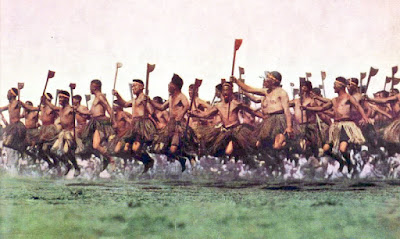A Haka Polynesian War Dance of the Maori called the
Peruperu performed in 1934
Understanding APPI Polynesian Samoan, Tongan, and Maori cursing isn't high on the cultural studies list but it's interesting to know what might be humorous, casually insulting, and fighting words. There is a past saying from around the early 1800s when Europeans were immigrating more to Aotearoa NZ "There are no cuss words only insults" which means (consequences are the same - call it what you will) which in turn means that no matter the words, may they be used wrongly, an insult is an insult so speak with respect, which again in recent western pop-culture means 'Don't start nothin', wont be nothin' ✌. Breaking it all down into a single post won't be attempted here but these might be some helpful notes.
A wrong move or gesture can be just as personal as a harsh phrase of words. An example would be coughing or sniffing upon a person's presence. Depending on the circumstances and who and when you do it too, it might be seen as an insult or rudeness. Another example would be scratching in an inappropriate place on the body (crotch, rear, or armpit area). Poor manners can mean instant consequences like facing the bottom of your feet to a man or a grown man sitting improperly in front of a woman with legs sprawled open. Again, consequences would depend on the circumstances.
All three Polynesian nationalities use very similar humor and phrasing. There are many types of Siva, Sipi, and Haka, some for celebrations and others for cultural War dances that use vial and aggressive movements.
In Pacific languages the word Kai is the most mixed word of all, used with popular insults such as "Kai Ta'e, or Kai Kuli". The insults mean "Eat feces", or "Eat Sh!t", the other means to "Eat a Dog". It's demand to action, to get down and start eating. There are poor translations online that say the word "Kai" only means food. The insult to "Eat a Dog" is at times more insulting, as it means for a "stray person to eat a stray animal".
"I attempted once to keep a dear friend who is Polynesian (but raised off island) from naming their new born Kai, she didn't listen, and I'm afraid one day it will really effect the child if he or she meets their own people. I told my full Polynesian side of the family what she was planning to do and instantly I heard giggles. My mother in-law starting laughing and said it's her fault for not listening to me, then she started laughing, after she made a few cussing jokes. I'm sure it would be the same if you named your child Dooshie 💢 or Assandra in the states, just wouldn't fit quite right"
The more casual Tongan insult phrase is "Kai Ta'e", said very playfully and used to tease mostly between grown men, almost jokingly saying "idiot, get down to eat sh#t". Some insult phrases are much more aggravating and far more forbidden.
Casual Insulting:
Go touch your butt nicely
Go take a poop in the road (get hit by something while pooping)
Go play with yourself in the road (get hit by something, while..)
Go wipe your butt with a leaf
Go wipe your butt with a stone
Go eat a Dog
Follow like a dog
New guy Eat a poop 💩
Old guy Eat a poop 💩
Eat a poop (widely and casually used)
Eat the lips of vagina
And what, why is your face scary
And what, eat poop
And what, who are you
Go wash the butt
You sleep dirty at night
You sleep smelling at night
You wake up smelling
Your face is shaped like a women's vagina (used against older people)
You stink like a Bat (which smells like an armpit)
To note there is no use of the "f-bomb" in pacific languages and is a western swear word. The "f-word" when used is taken very differently as it is misinterpreted and the meaning scrambled in translation, as to think one might want to immediately start having sex. In short, saying the f-bomb to a true islander would be insulting but not in the western sense. Instead of it being interpreted as a cuss-word it would be thought as a demand to "get down now, we are having sex".



 Posted in:
Posted in: 







































